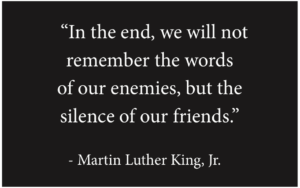Then and Now: Dismantling Systemic Racism for Equity


Although the recent swell of a global pandemic and exposure of the deep-rooted heinous incidents of police brutality have incited protests, triggered a wave of statements, goodwill, and diversity and inclusion efforts across corporate and institutional sectors, it is important to recognize the long-standing grassroots efforts of activists in the US. For several years a diverse cadre of local advocacy groups and leaders have dedicated their lifetimes to exposing the deleterious effects of systemic racism on population health. These groups have a documented history of organizing to dismantle systems of oppression that are infiltrated in the fabric of this country.
While many have recently awakened to their newfangled knowledge of systemic racism, social justice and public health have always been inextricably linked. For the past two decades, the denial of human rights and environmental protection has raised awareness of environmental racism and injustice. Environmental discrimination (e.g., toxic waste sites, poor air quality) and unsustainable practices have historically impacted communities of color. These discriminatory practices were the impetus for grassroots efforts and birthed the environmental justice movement in the late 1970’s and early 1980’s (1). Environmental discrimination is merely one example of why we must recognize racism as a pre-existing condition impacting communities of color. Hazardous environmental conditions resulting from discriminatory practices have exacerbated vulnerabilities for communities of color during this pandemic. Environmental conditions compounded with inequitable health care practices demonstrate that systemic racism is multi-layered and stems from multiple sources of discriminatory practices.
Racism is a public health crisis. COVID-19 may be the current pandemic but this country has been plagued with another pandemic that has historically pervaded communities of color in this country: racism. Racism undergirds the economic foundation for the ever-widening wealth gap for white beneficiaries today. Although chattel slavery was abolished it is important to note that racism seldom rears its head in acts of bigotry. Racism has conformed and is operating in our systems. Racism has manifested itself into structures and policies in this country. Therefore, we should not limit our response to systemic racism by removing symbols of racial oppression and participating in synchronized expressions of solidarity (e.g., removing statues, kneeling with kente cloths and singing the Black National Anthem). These responses on their own are not practical solutions for dismantling a system. It will require a multi-pronged and systemic approach. Michelle Alexander states in her book, The New Jim Crow, “Since the nation’s founding, African Americans repeatedly have been controlled through institutions such as slavery and Jim Crow, which appear to die, but then are reborn in new form tailored to the needs and constraints of the time.” (2) We are witnessing an indelible time in our history. We are seeing a diverse cadre of interracial and multi-generational people organize in a collective movement for social justice. In this solidarity it is imperative for all races to empathize and understand the significance of black lives in this moment in history. When individuals begin to challenge the need to focus on black lives we should reflect and consider this perspective: When the deadly shootings in Las Vegas took place, people changed their profiles and hashtags to, “Stand with Vegas,” not “Stand with Everywhere.” When we raise awareness about breast cancer people do not counter with saying, “Wait, what about lung cancer?” So why do people counter “Black Lives Matter” with an “all- inclusive” All Lives Matter? (3) Focusing on black lives does not devalue any other race/ ethnicity group’s oppressive experience in this country, rather it unifies us together to amplify the truth of a racial experience unique to black people in this country. We are all products of an intentional orchestration of poor imaging of black people through various touch points in society. These associations are what feeds our implicit biases. We must reflect and reassess our biases towards black lives and work hard to dismantle these beliefs. This is the beginning of doing this work.


White allies: I challenge you to leverage your privilege and power granted to you freely and advocate for systemic change and equity in your institutions. Your voice and commitment to understanding systemic racism is the catalyst to dismantling this system created by your ancestors. Remember, continue to read, learn, and grow as an ally. You can never arrive in this work. Four-hundred years of inequality will not be solved tomorrow. In the meantime, never stop challenging the system. The moment you stop challenging the system is the moment that you unconsciously conform back to your complacency and silence. Concurrently, the system will revert back to its original form operating the way it was intended – to oppress blacks and unfairly advantage whites. North Carolina Public Health Association represents public health professionals across the state who stand in solidarity and acknowledge racism as a public health issue. Join us in contributing to a legacy of fighting for social justice and health equity for future generations. This piece was originally published in the North Carolina Public Health Association‘s July 2020 e-newsletter.